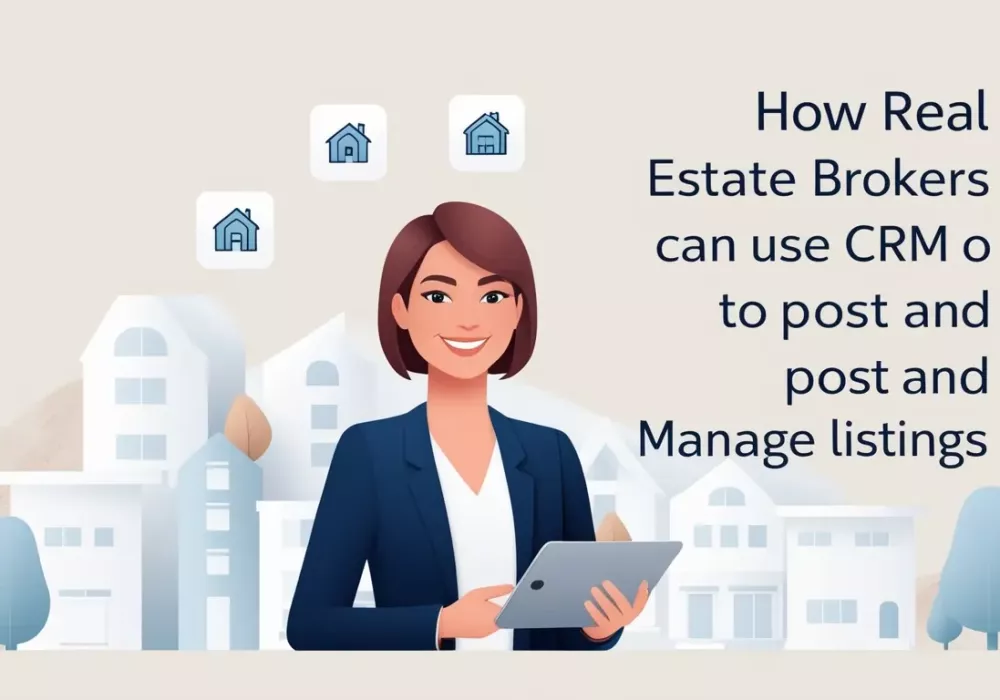
How Real Estate Brokers Can Use CRM to Post and Manage Listings
Managing property listings and client interactions can be challenging for real estate brokers. A real estate broker CRM offers an all-in-one solution for tracking properties, communicating with clients, and converting leads into successful deals. By using CRM software for real estate agents, brokers can easily post property for sale, manage rental properties, and streamline their entire business process.
1. Centralized Property Listings
A real estate broker CRM lets brokers manage all their listings—both sales and rentals—in one place. You can post property for sale and post rental property CRM listings with detailed information like price, images, and locations. This central hub allows brokers to easily track the status of properties and make updates without using multiple tools or platforms.
Key Benefits:
- One platform for all sales and rental properties.
- Real-time updates for easy property management.
- Streamlined listing process saves time and reduces errors.
2. Automated Lead Follow-Ups
With a real estate lead management software, brokers can automate follow-ups with clients. When someone shows interest in a property, the CRM automatically sends them reminders, schedules calls, or provides additional information. This ensures potential buyers or renters don’t slip through the cracks, helping brokers focus on closing deals rather than chasing leads.
Benefits of Automation:
- Saves time by automating communication.
- Prioritizes hot leads for quicker responses.
- Boosts lead conversion with timely follow-ups.
3. Customized Workflows for Property Management
Each broker handles real estate transactions differently, and CRM software for real estate agents offers customizable workflows to suit their needs. Whether brokers post property for sale or rent, the system can create tailored processes to ensure smooth real estate listing management from client contact to final closing.
Workflow Advantages:
- Define stages like property viewings, offers, and contracts.
- Set alerts for important milestones.
- Track every step to avoid missing important actions.
4. Easy Communication with Clients
Communication is key to success in real estate. A real estate broker CRM helps maintain organized, clear communication with clients. Brokers can send personalized messages and updates when they post property for sale or add new listings. Automated emails, SMS, and reminders keep clients engaged and informed throughout the transaction.
Improved Communication:
- Automate regular updates and personalized messages.
- Keep records of all client interactions for easy reference.
- Respond faster with real-time notifications.
5. Mobile Access for On-the-Go Listings
Real estate brokers are often out in the field, showing properties or meeting clients. Most CRM software for real estate agents is mobile-friendly, allowing brokers to manage listings from their phones. Whether they need to post property for sale or update a post rental property CRM, brokers can stay connected and in control of their listings even while on the move.
Mobile Benefits:
- Access property listings and client information from anywhere.
- Update listings in real-time while at property viewings.
- Manage leads and listings remotely.
6. Marketing Integration for Better Property Visibility
Many real estate broker CRM systems come with integrated marketing tools. Brokers can market properties directly from the CRM by sharing listings via email or social media platforms. This means a post rental property CRM or post property for sale listing can be seen by a larger audience, increasing visibility and attracting more clients.
Marketing Advantages:
- Promote listings across multiple platforms with one click.
- Track the performance of marketing campaigns directly in the CRM.
- Improve property exposure and reach a wider audience.
7. Data-Driven Decisions with Analytics
With real estate lead management software, brokers can gain valuable insights through data analytics. CRMs allow brokers to track how their properties are performing, see which marketing strategies are working, and make data-driven decisions to optimize their efforts. This helps in refining marketing approaches and improving overall sales outcomes.
Analytics Benefits:
- Real-time insights on property views and leads.
- Evaluate the effectiveness of marketing strategies.
- Make better business decisions with data-driven reports.
8. Collaborative Tools for Broker Teams
In larger real estate firms, CRM systems offer collaborative tools that let multiple agents work together on listings. Each agent can access shared property information, track lead progress, and contribute to closing deals. The real estate listing management system allows brokers and agents to stay coordinated, ensuring smoother transactions and better client service.
Collaboration Features:
- Share property and client data across teams.
- Work on listings together for more efficient management.
- Track team performance and lead conversions.
Read more Role of CRM in Boosting Real Estate | Best CRM Software for Commercial Real Estate Professionals
Frequently Asked Questions
- How can a real estate broker CRM help me post property for sale?
A real estate broker CRM simplifies the process of managing property listings by centralizing everything in one place, making it easy to post property for sale and keep track of updates. - What are the key benefits of CRM software for real estate agents?
CRM software for real estate agents helps with automating lead follow-ups, tracking client communication, and organizing real estate listing management, saving time and improving efficiency. - Can I use CRM for real estate lead management?
Yes, most CRMs offer real estate lead management software that allows brokers to automate lead follow-ups, prioritize prospects, and track client interactions to improve conversions. - How do I post rental property CRM listings with a CRM?
With a real estate broker CRM, you can easily post rental property CRM listings by adding property details, images, and pricing. The system manages the entire listing process for you. - How does real estate listing management work in CRM software?
Real estate listing management in a CRM helps brokers track the status of their listings, from initial contact to property closing. It also offers tools for automating updates and keeping clients informed.
Posted
1 year ago by Upendra thapa
Leave a Reply